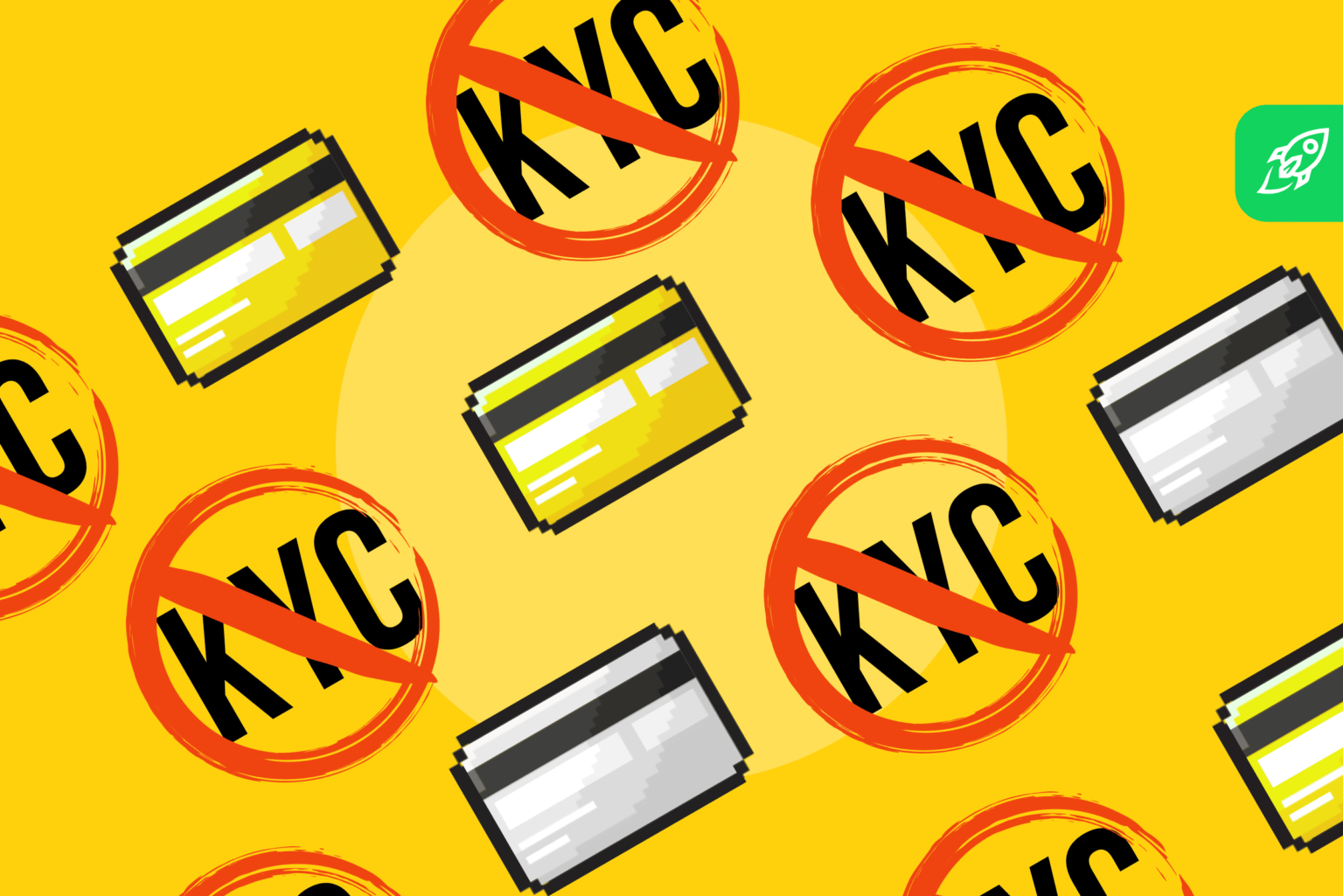beginner
In many ways, KYC has almost become synonymous with crypto — after all, most platforms these days ask users to verify their identity one way or another before they let them interact with their service. Is it possible to bypass KYC verification and buy, exchange, and trade crypto without it? Let’s find out.
What Is KYC?
First of all, let’s take a closer look at KYC and recognize why it is so prevalent in the crypto world.

KYC, or “Know Your Customer,” is a set of guidelines meant to help financial institutions verify the identity of their customers. In addition, it can also be used to measure a person’s financial capability and potential risk factors.
KYC verification may involve the following checks:
- ID verification (passports, driving licenses, and so on);
- Facial/biometric scanning;
- Address verification (utility bills, bank statements, etc.);
- Payment method verification.
KYC is typically fully automated. In most cases, it will only take a few minutes for the machine to check whether you are a real human being and if the information you’ve entered is correct. Nonetheless, KYC can take a bit longer if it is required after a transaction has been flagged as suspicious, but such cases are incredibly rare and won’t affect 95% of users.
Enjoying this article? Then don’t hesitate to subscribe to our weekly newsletter!
Why Do Cryptocurrency Exchanges Insist on KYC?
As crypto becomes more mainstream and popular, it turns into a breeding ground for money laundering and scams of all shapes and sizes. KYC was a response both to that and to increasing demands from regulators, especially Western ones.
KYC guards crypto exchanges and other platforms from scammers that want to launder illegally gained funds. It also helps governments to regulate taxation and helps to trace stolen funds. All of these things are vital for keeping the crypto industry safe and secure — and necessary if crypto is ever to go fully mainstream. You can learn more about why exchanges use KYC in this article.
Why Someone Might Want to Avoid KYC in Crypto
Although even with KYC, crypto is still a lot more private and decentralized than fiat currencies, many users prefer to leave no digital footprint whatsoever. The verification process also acts as an additional (and, at times, rather lengthy and annoying) step people have to take before they can get their hands on crypto. Not to mention, not everyone is comfortable with sharing their personal data.
Thankfully, there are quite a few ways to buy and trade Bitcoin and other cryptocurrencies without KYC.
Best No-KYC Crypto Exchanges
Here are some of the easiest ways to purchase crypto without KYC.
Peer-to-Peer Trading
P2P, or peer-to-peer trading, is one of the most reliable ways to purchase crypto without KYC. After all, these platforms simply connect buyers and sellers without interfering in their transactions.
P2P platforms, however, have some downsides: they generally have less flexibility in terms of the type of crypto you can get, lower liquidity, and longer transaction execution time. There is always a high risk of being cheated out of your money — always check a seller’s reviews before making contact with them. Please beware that some people may have fake reviews. In-person cash payments are usually the most reliable payment method. Another popular way to pay for P2P orders is via bank transfers.
HodlHodl
This non-custodial P2P exchange platform facilitates transactions between users by making them a multisig wallet. They have a relatively high fee of 0.6%, but it is split between both the sender and the receiver. They only work with Bitcoin.

Bisq
This fully decentralized peer-to-peer platform offers to connect crypto buyers and sellers without KYC. It is essentially a piece of software that organizes P2P trades in a fully trustless yet secure and transparent way. Bisq is also fully non-custodial and does not hold any user money, be it fiat or digital currency.
Crypto Exchanges
Although most crypto exchanges have some sort of KYC built in, it is not a requirement, and most users will never have to pass verification. Above all, centralized crypto exchanges remain the most convenient and easiest way to get crypto — and one with relatively low trading fees.
Changelly
Changelly does not sell crypto directly — our platform does it via our trusted fiat providers. All of them have KYC verification. However, you can still buy USDT or another crypto on a P2P platform and then use Changelly to exchange it for one of the 400+ cryptocurrencies we have listed. Our KYC policy only affects a very small number of users, and if you use our newly launched DeFi Swap, you won’t have to worry about it at all.

KuCoin
Although KuCoin is advertised as one of the exchanges without KYC, it actually isn’t one. Although they don’t require KYC for purchases, users will still need to pass verification to withdraw their funds. KYC isn’t required for withdrawals of under 2 BTC a day.
Digitex
Digitex is one of the best crypto exchanges if you’re looking for unverified purchases. This platform got rid of KYC verification back in 2020 after a data leak.
Decentralized Exchanges
While decentralized exchanges typically don’t require their users to create an account or pass any kind of verification, they don’t offer direct crypto purchases. You can “buy” crypto on these platforms via stablecoins like USDT or Tron instead.
Uniswap
Uniswap, the largest and one of the most popular decentralized exchanges, hasn’t implemented the KYC verification process. This exchange is also supported by its own native token UNI, which is ranked within the top 20 by market capitalization.
dYdX
The dYdX decentralized exchange runs on the Ethereum network and lets users trade crypto tokens without any third-party intermediaries. Unlike many other DEXs, dYdX provides users with a unique opportunity to open leveraged trading positions, meaning customers can deposit collateral and trade on margin. This platform does not require users to go through KYC.

Other Alternatives
Don’t want to use an exchange? That’s totally fine! There are alternative ways to purchase crypto without KYC.
Direct P2P
The best way to bypass verification is to buy crypto directly from another person without any intermediaries. It can be your friend, colleague, or a like-minded crypto enthusiast found on some Discord server.
Of course, it’s hard to trust people you don’t know that well, especially when there are no reviews, but if you have a lot of friends in the crypto community, this method will be the best choice for you. Just make sure to never send your money to people you don’t trust, and never send large amounts unless you have some sort of guarantee (like standing next to your friend and breathing down their neck while they send you those Bitcoins).
Bitcoin ATMs
You can also use Bitcoin ATMs to buy crypto without KYC. Please note, however, that some of them do require you to go through verification. They also tend to have higher trading fees and are often surrounded by CCTVs, which makes them significantly less private, even without KYC in the picture.

FAQ
What is a non-KYC crypto exchange?
A non-KYC crypto exchange is an exchange that does not require users to pass KYC verification to perform transactions. Beware that some exchanges that advertise themselves as “non-KYC” can have “hidden” KYC on withdrawals.
Is full anonymity possible in crypto?
Technically, yes. Blockchains keep full ledgers of all transactions, complete with wallet addresses, amounts, etc. However, all that data isn’t attached to any individual — both the sender and the recipient remain anonymous.
Why use a non-KYC crypto exchange?
A non-KYC crypto exchange is a platform that lets users perform various cryptocurrency transactions without having to verify their identity.
What is the best crypto exchange without KYC?
Some of the best crypto exchanges that don’t have KYC are HodlHodl, Uniswap, Changelly, and Bisq.
Can I buy crypto without KYC?
Yes, it is possible to buy and trade crypto without KYC. One can do it on P2P platforms, DEXs, and even major crypto exchanges like KuCoin or Changelly.
What can trigger KYC?
It can vary depending on a specific platform and its policies. Here’s what can trigger KYC on our crypto exchange:
- A single user creating multiple accounts with one-time-use email addresses;
- Users utilizing crypto wallet addresses that have been flagged as suspicious.
Are non-KYC exchanges safe?
Non-KYC exchanges are less secure than those that do have it by design. However, that doesn’t mean they are not safe: you just have to be extra careful when deciding whether you can trust a platform or not.
Will the government crack down on non-KYC exchanges?
Non-KYC crypto exchanges might have to review their verification policies in the future, but at the moment, this seems unlikely.
Do I have to report transactions from non-KYC exchanges on my tax return?
This can vary depending on your country of residence. Typically, you are required to report all your crypto income to the authorities, even if it comes from a non-KYC cryptocurrency trading exchange.
Does MetaMask need KYC?
No, MetaMask does not have any form of KYC verification — just like most other crypto wallets.
Disclaimer: Please note that the contents of this article are not financial or investing advice. The information provided in this article is the author’s opinion only and should not be considered as offering trading or investing recommendations. We do not make any warranties about the completeness, reliability and accuracy of this information. The cryptocurrency market suffers from high volatility and occasional arbitrary movements. Any investor, trader, or regular crypto users should research multiple viewpoints and be familiar with all local regulations before committing to an investment.

